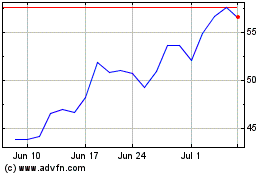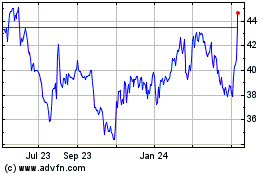By Dave Sebastian
Finance chiefs at travel companies are struggling to plan ahead
despite a recent pickup in bookings, as the coronavirus continues
to spread and a vaccine is still months, if not years, away.
"We're basically prevented from saying the word 'forecast' right
now because whatever we forecast...it's wrong," said Shannon
Okinaka, chief financial officer at Hawaiian Airlines. "So we've
started to use the word 'planning scenarios' or 'planning
assumptions.'"
The pandemic and local quarantine requirements have changed the
airline's outlook. Hawaiian expects its operations to be around 25%
smaller next summer compared with 2019, Ms. Okinaka said. The
company booked a loss of $106.9 million in its latest quarter,
compared with a profit of $57.83 million in the prior-year period.
Hawaiian's finance team now focuses more on booking levels, the use
of travel vouchers and refunds -- metrics it paid less attention to
before the pandemic when it focused on its revenue, Ms. Okinaka
said.
Most of the 17 S&P 500 companies in the leisure, arts and
hospitality space have withdrawn or lowered their financial
guidance due to the pandemic as of Sept. 15, according to Dow Jones
Newswires, indicating a lack of visibility into what the future
might hold.
Widespread lockdown orders and travel restrictions have resulted
in cancellations and a drop in new bookings at leisure businesses.
Travel could see a partial recovery in the U.S. next year,
depending on when a vaccine might arrive, but a complete rebound
may have to wait until 2023 as the nation recovers from the
recession, said Adam Sacks, president of the consulting firm
Tourism Economics.
Travel companies have raised billions of dollars in emergency
funds, retired aircraft, shut hotels and cut thousands of jobs in
an effort to survive, as some have generated little or no
revenue.
CFOs at these companies say they are updating their models more
frequently to respond to fluctuating customer demand and work with
various scenarios to reflect the uncertainty surrounding the
industry. They track cash flows on a regular, oftentimes weekly,
basis, said Anthony Jackson, a principal at Deloitte, the
professional services-firm.
Mr. Jackson said he advises companies to assess the effect of
economic metrics such as gross domestic product on their revenue
instead of relying on historical data. Historical performance
"might not be a very reliable indicator as to what your future
performance is going to look like," Mr. Jackson said.
Marriott International Inc., the biggest hotel operator in the
world, has moved to tracking its cash flows daily as it looks to
reduce its cash burn, finance chief Leeny Oberg said. The company,
which runs about 5,500 hotels in North America, saw occupancy rates
drop 57.4 percentage points for the three months ended June 30.
Marriott in August expected an average corporate cash burn of about
$45 million a month. The company booked a loss of $234 million in
the latest quarter, its largest core operating loss on record.
"When I think of a CFO's role, in many cases it's about a
balance of the short-, the medium- and the long-term needs of the
business," Ms. Oberg said. "In this case, the pandemic really
requires that you should just focus a bit more toward the shorter
term and also a really strong focus on cash flow."
Bookings by leisure travelers partly recovered as states began
relaxing stay-at-home rules, but corporate travel, an important
part of Marriott's business, remains depressed as companies
continue to operate remotely.
To gauge demand, the company's finance team tracks booking and
cancellation trends by market, length of stay and time, Ms. Oberg
said. Before the pandemic, Marriott focused more on monthly trends
and expectations further out to forecast demand, as opposed to
daily data.
Cruise operator Carnival Corp. has simplified its models for
financial forecasts in the face of so much uncertainty. Finance
chief David Bernstein and his team used to track roughly 65,000
price points in determining forecasts but now focus on just 12.
"It's not worth it to go in that level of detail," Mr. Bernstein
said. "You need to be flexible."
Carnival used to plan its itineraries about two years ahead of
sailings, Mr. Bernstein said. The company in recent months had to
reschedule trips on the go because of cross-border restrictions and
other disruptions, such as delays in ship deliveries. It reported a
loss of more than $4 billion for the quarter ended May 31 and
expects to burn about $650 million a month in the second half of
the year.
At Cedar Fair LP, the theme-park operator, decision-making now
involves more analytical thinking, CFO Brian Witherow said. "In
Covid terms, a week is like six months, and a month is like a
year," Mr. Witherow said. "Things just change so rapidly."
One tool that has helped him was a recent survey conducted in
the company's parks, Mr. Witherow said. He used the results to
calculate metrics such as net promoter score, used to gauge the
likelihood of guests recommending Cedar Fair parks to others, he
said.
Despite all the changes to their forecasting, some finance
chiefs still rely on their instincts. "I've got a good gut feel,"
said Carnival's Mr. Bernstein, who has been CFO since 2007.
Write to Dave Sebastian at dave.sebastian@wsj.com
(END) Dow Jones Newswires
September 20, 2020 09:14 ET (13:14 GMT)
Copyright (c) 2020 Dow Jones & Company, Inc.
Cedar Fair (NYSE:FUN)
Historical Stock Chart
From Mar 2024 to Apr 2024

Cedar Fair (NYSE:FUN)
Historical Stock Chart
From Apr 2023 to Apr 2024
